This article needs additional citations for verification .(November 2007) |
In both science fiction and utopia/dystopian fiction, authors have made frequent use of the age-old idea of a global state and, accordingly, of world government.
This article needs additional citations for verification .(November 2007) |
In both science fiction and utopia/dystopian fiction, authors have made frequent use of the age-old idea of a global state and, accordingly, of world government.
In tune with Immanuel Kant's vision of a world state based on the voluntary political union of all countries of this planet in order to avoid colonialism and in particular any future war ("Idee zu einer allgemeinen Geschichte in weltbürgerlicher Absicht", 1784; "Zum ewigen Frieden", 1795), some of these scenarios depict an egalitarian and utopian world supervised (rather than controlled) by a benevolent (and usually democratic) world government. Others, however, describe the effects of a totalitarian regime which, after having seized power in one country, annexes the rest of the world in order to dominate and oppress all mankind.
One major influence was Edward Bellamy's Looking Backward . The best-known advocate of world government was H. G. Wells. He describes such a system in The Shape of Things to Come , Men Like Gods and The World Set Free .
Some writers have also parodied the idea: E. M. Forster's The Machine Stops (1909) and Aldous Huxley's 1932 novel Brave New World . Wells himself wrote The Sleeper Awakes , an early vision of a dystopian world.
World government themes in science fiction are particularly prominent in the years following World War II, coincident with the involvement of many scientists in the actual political movement for world government in response to the perceived dangers of nuclear holocaust. Prominent examples from the Cold War era include Childhood's End (1953), Starship Troopers (1959), Star Trek (from 1966), the Doctor Who story The Enemy of the World (1968) and Captain Scarlet and the Mysterons (1968) Later references to a unified world government also appear however in post-Cold War science fiction television series such as Babylon 5 .
The concept also appears frequently in science fiction anime, whether in the form of a strengthened United Nations or an entirely new organizations with world presidential election. Examples of anime with this premise are Macross (adapted in America as the first part of Robotech) and Gundam .
This section needs additional citations for verification .(July 2020) |
President of Earth (also known as President of the World) is a fictional concept or character who is the leader of Planet Earth. Examples include the following:

In the fictional universe of Star Trek, the United Federation of Planets (UFP) is the interstellar government with which, as part of its space force Starfleet, most of the characters and starships of the franchise are affiliated. Commonly referred to as "the Federation", it was introduced in the original Star Trek television series. The survival, success, and growth of the Federation and its principles of freedom have become some of the Star Trek franchise's central themes.
Galactic empires are a common trope used in science fantasy and science fiction, particularly in works known as 'space operas'. Many authors have either used a galaxy-spanning empire as background or written about the growth and/or decline of such an empire. The capital of a galactic empire is frequently a core world, such as a planet relatively close to a galaxy's supermassive black hole, which has advanced considerably in science and technology compared to current human civilization. Characterizations can vary wildly from malevolent forces attacking sympathetic victims to apathetic bureaucracies to more reasonable entities focused on social progress and anywhere in between.
A ship prefix is a combination of letters, usually abbreviations, used in front of the name of a civilian or naval ship that has historically served numerous purposes, such as identifying the vessel's mode of propulsion, purpose, or ownership/nationality. In the modern environment, prefixes are cited inconsistently in civilian service, whereas in government service a vessel's prefix is seldom omitted due to government regulations dictating that a certain prefix be used. Today the common practice is to use a single prefix for all warships of a nation's navy, and other prefixes for auxiliaries and ships of allied services, such as coast guards. For example, the modern navy of Japan adopts the prefix "JS" – Japanese Ship. However, not all navies use prefixes. Among the blue-water navies, those of France, Brazil, China, Russia, Germany, and Spain do not use ship prefixes. NATO designations such as FS, FGS, and SPS can be used if needed.
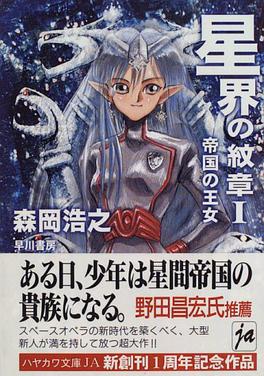
Crest of the Stars is a three-volume space opera science fiction novel written by Hiroyuki Morioka with cover illustrations by Toshihiro Ono. This was followed by a second, ongoing novel series, Banner of the Stars and a series of books collecting short stories set in the same universe known as Fragments of the Stars.
CoDominium is a series of future history novels written by American writer Jerry Pournelle, along with several co-authors, primarily Larry Niven.

In Death Ground is a 1997 military science fiction novel by American writer David Weber and Steve White. The story is completed in the novel The Shiva Option.

Killzone is a first-person shooter video game developed by Guerrilla Games and published by Sony Computer Entertainment for the PlayStation 2. It was originally released on 2 November 2004 in North America and 26 November 2004 in Europe. The game was remastered in HD by Supermassive Games and re-released within the Killzone Trilogy for PlayStation 3 as well as a standalone PSN title in 2012.
A federation is a state governed under the system of federalism.

Star Drive is a science fiction campaign setting that was published in 1998 by TSR, Inc. for the Alternity role-playing game. The first published setting for Alternity was provided in the Star Drive Campaign Setting book in 1998.
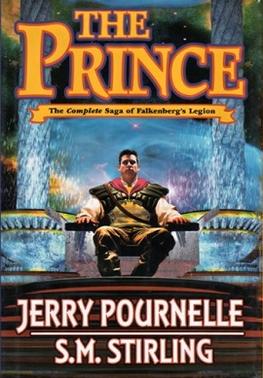
The Prince is a science fiction compilation by Jerry Pournelle and S. M. Stirling. It is part of the CoDominium future history series. The Prince is a compilation of four previously published novels: Falkenberg's Legion, Prince of Mercenaries, Go Tell The Spartans, and Prince of Sparta. Of the original novels, the first two were written by Pournelle alone; the last two were cowritten with Stirling. Pages 174–176 of the printed edition are new to the compilation. The Prince was published by Baen Books in hardcover (ISBN 0-7434-3556-7) in September 2002.

The Saga of Seven Suns is a series of seven space opera novels by American writer Kevin J. Anderson, published between 2002 and 2008. The books are set in a not-too-distant future where humans have colonized a number of other planets across the galaxy, thanks in part to technological assistance from an ancient alien race, the Ildirans. The series chronicles the universe-spanning war that erupts when humans inadvertently ignite the fury of a hidden empire of elemental aliens known as the hydrogues. Internal conflict is sparked within both the human and Ildiran empires as other ancient elemental races reappear to renew their own ancient war with the hydrogues.
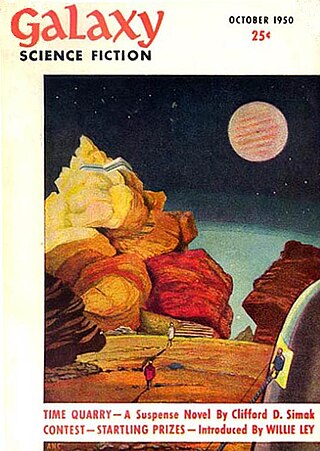
The planetary systems of stars other than the Sun and the Solar System are a staple element in many works of the science fiction genre.

The Psychotechnic League is a future history created by American science fiction writer Poul Anderson. The name "Psychotechnic League" was invented by Sandra Miesel during the early 1980s, to capitalize on Anderson's better-known Polesotechnic League future history. Anderson published 21 novels, novellas and short stories set in this future between 1949 and 1957, with a 22nd published in 1968.
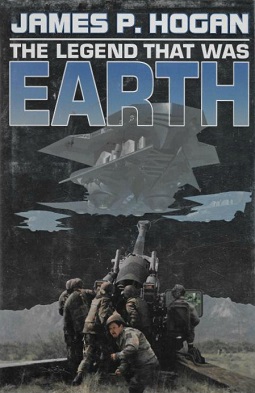
The Legend That Was Earth is a novel by science fiction author James P. Hogan; it was published in 2000 by Baen Publishing Enterprises. It includes several themes common to science fiction, such as dystopias, alien encounters, and the distinctions of personhood.
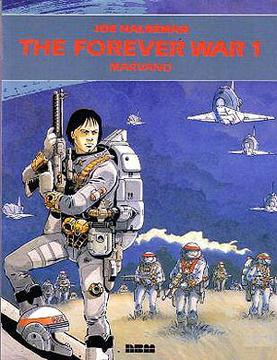
The Forever War is a 1988 Belgian science fiction graphic novel trilogy drawn by Marvano and closely based on the award-winning The Forever War novel by Joe Haldeman, who has noted that he "supplied all of the dialogue and scripted [the comic] like a movie".

The Viagens Interplanetarias series is a sequence of science fiction stories by L. Sprague de Camp, begun in the late 1940s and written under the influence of contemporary space opera and sword and planet stories, particularly Edgar Rice Burroughs's Martian novels. Set in the future in the 21st and 22nd centuries, the series is named for the quasi-public Terran agency portrayed as monopolizing interstellar travel, the Brazilian-dominated Viagens Interplanetarias. It is also known as the Krishna series, as the majority of the stories belong to a sequence set on a fictional planet of that name. While de Camp started out as a science fiction writer and his early reputation was based on his short stories in the genre, the Viagens tales represent his only extended science fiction series.

The Sky People is an alternate history science fiction novel by American writer S. M. Stirling. It was first published by Tor Books in hardcover in November 2006, with a book club edition co-published with the Science Fiction Book Club following in December of the same year. Tor issued paperback, ebook, and trade paperback editions in October 2007, April 2010, and May 2010 respectively. Audiobook editions were published by Tantor Media in January 2007.
The Lost Fleet is a military science fiction series written by John G. Hemry under the pen name Jack Campbell. The series is set one-hundred-plus years into an interstellar war between two different human cultures, the Alliance and the Syndicate. The protagonist of the story is discovered floating in a suspended animation escape pod one hundred years after he made an "heroic last stand" against an enemy fleet. In his absence, he has been made into a renowned hero in the Alliance, but his legend and actions are used to justify poor tactics and decisions. Awakened after being discovered during a secret mission that turns out to be an enemy trap, he is suddenly dropped into the role of fleet commander and expected to live up to the legend that has grown around him.